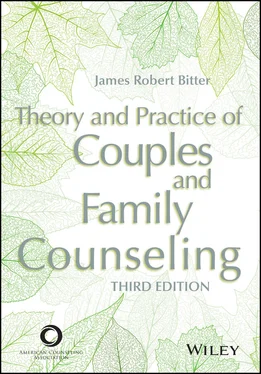James Robert Bitter - Theory and Practice of Couples and Family Counseling
Здесь есть возможность читать онлайн «James Robert Bitter - Theory and Practice of Couples and Family Counseling» — ознакомительный отрывок электронной книги совершенно бесплатно, а после прочтения отрывка купить полную версию. В некоторых случаях можно слушать аудио, скачать через торрент в формате fb2 и присутствует краткое содержание. Жанр: unrecognised, на английском языке. Описание произведения, (предисловие) а так же отзывы посетителей доступны на портале библиотеки ЛибКат.
- Название:Theory and Practice of Couples and Family Counseling
- Автор:
- Жанр:
- Год:неизвестен
- ISBN:нет данных
- Рейтинг книги:5 / 5. Голосов: 1
-
Избранное:Добавить в избранное
- Отзывы:
-
Ваша оценка:
- 100
- 1
- 2
- 3
- 4
- 5
Theory and Practice of Couples and Family Counseling: краткое содержание, описание и аннотация
Предлагаем к чтению аннотацию, описание, краткое содержание или предисловие (зависит от того, что написал сам автор книги «Theory and Practice of Couples and Family Counseling»). Если вы не нашли необходимую информацию о книге — напишите в комментариях, мы постараемся отыскать её.
Theory and Practice of Couples and Family Counseling — читать онлайн ознакомительный отрывок
Ниже представлен текст книги, разбитый по страницам. Система сохранения места последней прочитанной страницы, позволяет с удобством читать онлайн бесплатно книгу «Theory and Practice of Couples and Family Counseling», без необходимости каждый раз заново искать на чём Вы остановились. Поставьте закладку, и сможете в любой момент перейти на страницу, на которой закончили чтение.
Интервал:
Закладка:
Justice refers to fairness, including equitable service for all clients. In 2004–2005, Counselors for Social Justice, a division of ACA, developed a website that specifically targeted issues of equity, oppression, discrimination, and injustice (see https://www.counseling-csj.org). Such a development highlights how valued this principle is within the counseling profession:
Counselors for Social Justice works to promote social justice in our society through confronting oppressive systems of power and privilege that affect professional counselors and our clients and to assist in the positive change in our society through the professional development of counselors. (Counselors for Social Justice, 2020)
In the teaching of ethics, the principle of justice has been the most misunderstood and debated. For many, equality and fairness mean equal treatment or the same treatment. Relational counselors understand equality to mean that all people have an equal right to be valued and respected even when they are different from one another. Both philosophy (Aristotle, 350 B.C.E./1985) and systems theory (Bateson, 1979) have noted that differences cannot be ignored: Being just means treating similar people similarly and different people differently.
For example, is working with a family with an only child and an income of more than $100,000 the same as working with a family of eight whose income is less than $25,000? Is the difference in incomes different enough to warrant a different way of providing family counseling? Do you think poverty has real effects on family life? If you are in private practice, and you have set a rate for your services at $100 per hour, will you even see the poorer family? How will you bill them? Will you see them for free or on a sliding scale? And how many poor families will you be able to accept in your practice and still make a living yourself? Justice requires that you wrestle with these issues before you even see your first family.
Veracity is the implementation of truthfulness: It is intimately related to personal and professional integrity. It has only been recently that veracity has been included in major ethical texts (Corey et al., 2019). One reason for including veracity in the list of ethical principles is the increasing requirements of managed care. Managed care dictates not only the treatment people receive from medical doctors but also the services delivered to individuals and families for mental health problems. In the name of controlling health care costs, managed care companies limit the type and duration of services offered to clients. To remain on a preferred provider list, family practitioners must agree to abide by the parameters set by such companies. This means that family practitioners within a managed care system must wrestle with split loyalties. Being truthful, an essential part of informed consent, is essential for resolving professional conflict in the managed worlds of hospitals and community agencies.
These six common ethical principles do not exist independent of one another. A. Hill (2004) suggested that they are present in any ethical dilemma; the family practitioner, however, needs to assess which principles are most relevant to any given situation and how other principles might also be addressed. Deciding which ethical principle is most pertinent in any given situation can be a difficult task. The decision often depends on your in-the-moment interpretation of the ethical principles, consultation with other professionals, and guidance from your profession’s code(s) of ethics.
What would be an action that you would define as promoting the clients’ welfare in the case of the 14-year-old child with leukemia? In reviewing your profession’s codes of ethics, you find no statement that begins with “When counseling a family whose child has leukemia and whose religious beliefs do not support medical intervention, you must …” What you will find in codes of ethics are statements such as “The primary responsibility of counselors is to respect the dignity and promote the welfare of clients” (ACA, 2014, Standard A.1.a.) or the indication that “couple and family counselors do not engage in actions that violate the legal standards of their community and do not encourage client or others to engage in unlawful activities” (IAMFC, 2017, p. 4), or the indication that marriage and family therapists participate in activities that contribute to a better community and society (AAMFT, 2015).
So what can we glean from these statements that might help? The ACA Code of Ethics (ACA, 2014) makes beneficence the primary ethical responsibility. Okay, what action(s) serve(s) to promote the family’s welfare? Respecting their welfare may mean respecting their autonomy to make decisions on their own. Yet respecting autonomy may contribute to the parents ending up in court facing either jail time or the removal of their child from their custody. Whose welfare is served then?
The IAMFC Code of Ethics (IAMFC, 2017) asks you to ponder the legal standards of the community within which you practice. At issue here is the community’s definition of “child neglect” (probably a state statute). For example, the state of Wisconsin defines child neglect as follows:
Any person who is responsible for a child’s welfare who, through his or her action or failure to take action, for reasons other than poverty, negligently fails to provide any of the following [necessary care, food, clothing, medical care, shelter, education, or protection from exposure to drugs], so as to seriously endanger the physical, mental, or emotional health of the child, is guilty of neglect. (Wisconsin Penal Code, 2005, §948.21[2])
If you are practicing in Wisconsin, respecting the parents’ autonomy may contribute to the death of their child, a Class D felony. A similar statute exists in the state of Idaho. It appears that in both states the most relevant principle is beneficence, in particular the beneficence of a child.
This family example shows the constructivist nature of ethical decision-making when viewing problems through principle ethics. The words and intent of the codes, together with relevant legislation, all carry various meanings. In such cases, the local interpretation of ethical principles significantly influences a family practitioner’s actions.
Freeman and Francis (2006) noted one significant problem with principle ethics: They have been given relevance and authority separate from and prior to their actual use in ethical decision-making. Autonomy, for example, is important in any given case, because autonomy is valued as a principled guide to action. In theory, it supersedes localized interpretations and applications of ethical standards. To be sure, principle ethics in some cases can remind family practitioners to be sensitive to diverse cultures when local interpretations and laws are not (e.g., in supporting the welfare of sexual and gender minority clients). In some cases, however, the principles themselves may not be culturally sensitive (e.g., autonomy in relation to non-Western cultures), and the practitioner is left to adapt them to fit the needs of the culture, thereby challenging the very foundation on which principle ethics is based (DuBois, 2004).
The family case we have presented highlights the potential impact of religion on the application of the ethical principles. Other cultural influences include race, ethnicity, nationality, age, gender, sexual and affectional orientation, ability and disability, and poverty. DuBois (2004) suggested that ethical principles may have universal relevance, but the focus should be on how the specific principles are enacted within a given culture. That is, the question is not whether autonomy is a relevant principle in Sri Lanka; rather, it is how Sri Lankans respect autonomy.
Virtue Ethics
Интервал:
Закладка:
Похожие книги на «Theory and Practice of Couples and Family Counseling»
Представляем Вашему вниманию похожие книги на «Theory and Practice of Couples and Family Counseling» списком для выбора. Мы отобрали схожую по названию и смыслу литературу в надежде предоставить читателям больше вариантов отыскать новые, интересные, ещё непрочитанные произведения.
Обсуждение, отзывы о книге «Theory and Practice of Couples and Family Counseling» и просто собственные мнения читателей. Оставьте ваши комментарии, напишите, что Вы думаете о произведении, его смысле или главных героях. Укажите что конкретно понравилось, а что нет, и почему Вы так считаете.












